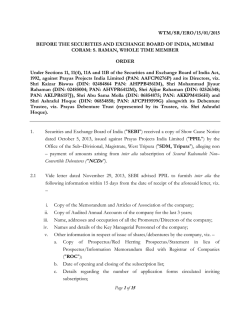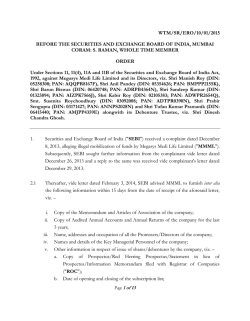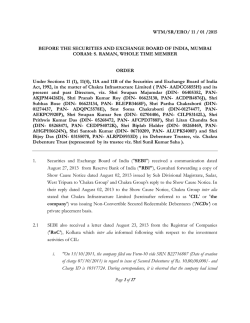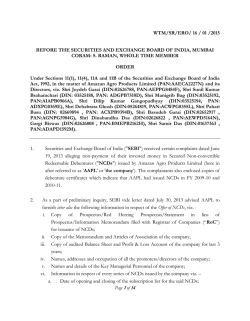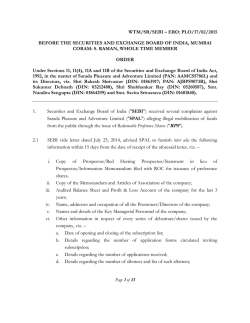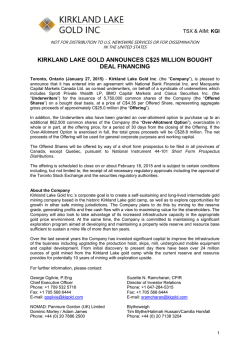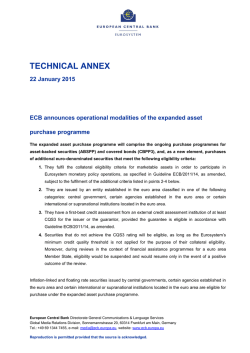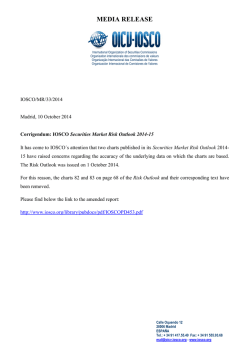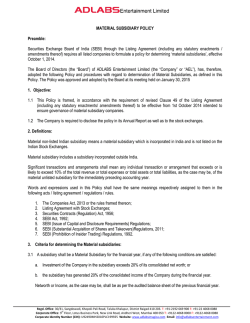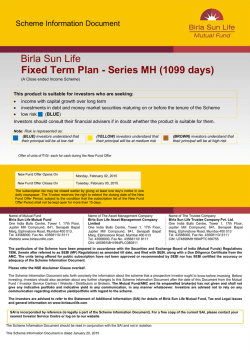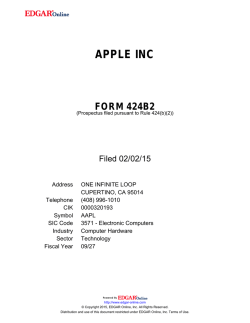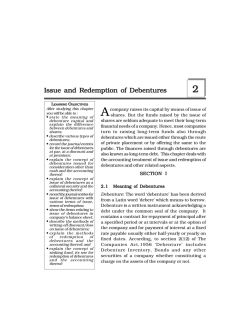
WTM/SR/ERO/14/01/2015 BEFORE THE SECURITIES AND
WTM/SR/ERO/14/01/2015
BEFORE THE SECURITIES AND EXCHANGE BOARD OF INDIA, MUMBAI
CORAM: S. RAMAN, WHOLE TIME MEMBER
ORDER
Under Sections 11, 11(4), 11A and 11B of the Securities and Exchange Board of India Act,
1992, against Vikdas Industries Limited (PAN: AADCV5860F) and its Directors, viz. Shri
Indranil Sinha (DIN: 01307720; PAN: ATIPS7061A), Shri Debasish Das (DIN: 02431426;
PAN: AGWPD4747K), Shri Sandip Paul (DIN: 06622058; PAN: BBAPP0971P), Shri
Goutam Chatterjee (DIN: 01095937; PAN: ADWPC8320Q), Shri Ramen Chatterjee (DIN:
01159399; PAN: ACTPC0530E), Shri Sachin Kumar Thakur (DIN: 06560350; PAN:
AJUPT3341C), Shri Jadunath Jena (DIN: 03169961; PAN: ANUPJ8465D) and Shri
Bhabagrahi Behera (DIN: 05113111, PAN: ASWPB3847N) alongwith its Debenture
Trustee, viz. Vikdas Industries Debenture Trust (represented by its Trustee, viz. Shri
Ranadeb De).
1.
Securities and Exchange Board of India ("SEBI") received complaints against Vikdas
Industries Limited ("VIL") alleging non – payment of amounts arising from subscription
of Secured Non–Convertible Redeemable Debentures ("NCDs").
2.1
Vide letter dated March 12, 2014, SEBI advised VIL and its Directors to furnish inter alia
the following information within 15 days from the date of receipt of the aforesaid letter,
viz. –
i.
ii.
iii.
iv.
v.
Copy of the Memorandum and Articles of Association of the company;
Copy of Audited Annual Accounts and Annual Returns of the company for the last
3 years;
Name, addresses and occupation of all the Promoters/Directors of the company;
Names and details of the Key Managerial Personnel of the company;
Other information in respect of issue of shares/debentures by the company, viz. –
a. Copy of Prospectus/Red Herring Prospectus/Statement in lieu of
Prospectus/Information Memorandum filed with Registrar of Companies
("ROC");
b. Date of opening and closing of the subscription list;
Page 1 of 15
c.
Details regarding the number of application forms circulated inviting
subscription;
d. Details regarding the number of applications received;
e. Details regarding the number of allottees and list of such allottees, etc.;
f. Number of shares/debentures allotted and value of such allotment against each
allottee's name.
g. Details regarding subscription amount raised;
h. Date of allotment of shares/debentures;
i. Copies of the minutes of Board/Committee meeting in which the resolution has
been passed for allotment;
j. Date of dispatch of shares/debentures Certificates;
k. Details of the total number of applicants for each of VIL's scheme besides the
list of final allottee;
l. Copies of application forms, pamphlets, advertisements and other promotional
material circulated for issuance of shares/debentures;
m. Terms and conditions of the issue of shares/debentures;
n. Details of application for listing, if any, filed with stock exchanges;
o. Copy of Form 2 and Form 10 filed with ROC;
p. Details of Debenture Trustee.
2.2
Since no reply was forthcoming, vide letters each dated March 24, 2014, SEBI once again
sought the information (sought vide abovementioned letter dated March 12, 2014) from
the Directors of VIL.
2.3.1
VIL replied vide letter dated April 1, 2014, whereby it sought extension of time from
SEBI for submission of information. Thereafter, vide letter dated April 15, 2014, VIL
submitted that –
"This is to bring to your notice that we received the approval of Secured Non – Convertible Redeemable
Debenture of ₹ 50 Crores on 18th October 2011 from the Registered of Companies, West Bengal and
that mortgage was registered by the Registered of Assurances, Kolkata and out of that limit we issued the
above Debenture Certificate worth ₹ 11,75,000 in a different lot which is not exceed 49 persons in an
one lot for the financial year 2011-12 and ₹ 59,63,000 in a different lot which is not exceed 49 persons
in one lot for the financial year 2012-13.
Page 2 of 15
This is also (to) bring to your notice that our Company subsequently paid to the debenture Holder and
list of redemption are being made out from our end and the next occasion we should produce the same for
your reference."
2.3.2
However, subsequent to the above letter dated April 15, 2014, no further information
has been received from VIL.
3.
The material available on record i.e. correspondences exchanged between SEBI and VIL
alongwith the documents contained therein; information obtained from the Ministry of
Corporate Affairs' website i.e. 'MCA 21 Portal' alongwith the abovementioned
complaints, have been perused. On an examination of the same, it is observed that –
i.
VIL was incorporated on February 24, 2011, with the ROC, Kolkata, West Bengal
with CIN No. as U74900WB2011PLC159745. VIL has its Registered Office at
Nirmalya Apartment, 67/1/A, Ward No. 23, H. B. Town Road, Road No.–1, P.O.–
Sodepur, Kolkata–700110, West Bengal, India.
ii.
The present Directors in VIL are Shri Indranil Sinha, Shri Debasish Das, Shri Sandip
Paul, Shri Sachin Kumar Thakur, Shri Jadunath Jena and Shri Bhabagrahi Behera.
iii. Shri Goutam Chatterjee and Shri Ramen Chatterjee, who were earlier Directors in
VIL, have since resigned.
iv. From the material available on record, it is observed that VIL issued NCDs in
accordance with the following terms and conditions contained in the brochure i.e.
"Offer of NCDs":
a. "The offer is being made on a private placement basis and cannot be accepted by any person
other than to whom it has been offered, this offer cannot be transferred or rendered in anyone's
favour.
b. Use different application forms for different schemes.
c. Authority of the Issue: The debentures are being issued pursuant to the meeting of Board of
Directors of the Company held on 20th September, 2011.
d. Size of the Issue: ₹ 50 Crores, while it will be the company's endeavour to allot the debentures
as indicated the company has right to increase/decrease the size of the offer.
Page 3 of 15
e. Who can Invest: Any person is associated with the marketing trust/Broker House."
Term
(Months)
Plan
Name
24
36
60
120
A
B
C
D
Min.
Amount
(₹ )
10000
Term
(Months)
12
24
36
60
84
Plan
Name
E
F
G
H
I
120
168
v.
SCHEME – I
Interest
Interest
Monthly
Rate
Amount
(%)
12
1200
100
15
1500
125
18
1800
150
21
2100
175
SCHEME – II
Min.
Amount (₹ )
Half
Yearly
Yearly
300
375
450
525
600
750
900
1050
1200
1500
1800
2100
Interest
(₹ )
123
271
491
1078
2037
Refund
Amount
1123
1271
1491
2078
3037
J
4256
5256
K
9268
10268
1000
From the material available on record, details of NCDs issued by VIL are provided
below –
Year
Security
2011 – 12
– 13
Secured Non – Convertible
Redeemable Debentures
Total
**2012
Quarterly
Amount Raised
(₹ in Lakhs)
11.75
59.63
71.38
No. of Allottees
(Approx)
19
187
206
**VIL
issued NCDs in tranches during the Financial Year 2012 – 13 on various dates i.e.
12.12.2012; 21.12.2012; 3.01.2013; 18.01.2013; 22.02.2013 and 8.03.2013.
4.1
In the context of the abovementioned details of the Offer of NCDs, the issue for
determination in the instant matter is whether the mobilization of funds by VIL through
the aforesaid Offer, is in accordance with the provisions of the SEBI Act, 1992 ("SEBI
Act") read with the SEBI (Issue and Listing of Debt Securities), Regulations, 2008
("Debt Securities Regulations"); the Companies Act, 1956.
Page 4 of 15
4.2
I note that the jurisdiction of SEBI over various provisions of the Companies Act in the
case of public companies, whether listed or unlisted, when they issue and transfer
securities, flows from the provisions of Section 55A of the Companies Act. While
examining the scope of Section 55A of the Companies Act, 1956, the Hon'ble Supreme
Court of India in Sahara India Real Estate Corporation Limited & Ors. vs. SEBI
(Civil Appeal no. 9813 of 2011) (Judgment dated August 31, 2012) (hereinafter
referred to as the "Sahara Case"), had observed that:
"We, therefore, hold that, so far as the provisions enumerated in the opening portion of Section 55A of
the Companies Act, so far as they relate to issue and transfer of securities and non-payment of dividend is
concerned, SEBI has the power to administer in the case of listed public companies and in the case of
those public companies which intend to get their securities listed on a recognized stock exchange in India."
4.3
In this regard –
i.
Reference is also made to Sections 67(1) and 67(3) of the Companies Act, 1956,
which are reproduced as under:
"67. (1) Any reference in this Act or in the articles of a company to offering shares or debentures to
the public shall, subject to any provision to the contrary contained in this Act and subject also to the
provisions of sub-sections (3) and (4), be construed as including a reference to offering them to any
section of the public, whether selected as members or debenture holders of the company concerned or
as clients of the person issuing the prospectus or in any other manner.
(2) Any reference in this Act or in the articles of a company to invitations to the public to subscribe
for shares or debentures shall, subject as aforesaid, be construed as including a reference to
invitations to subscribe for them extended to any section of the public, whether selected as members or
debenture holders of the company concerned or as clients of the person issuing the prospectus or in
any other manner.
(3) No offer or invitation shall be treated as made to the public by virtue of sub- section (1) or subsection (2), as the case may be, if the offer or invitation can properly be regarded, in all the
circumstances(a) as not being calculated to result, directly or indirectly, in the shares or debentures becoming
available for subscription or purchase by persons other than those receiving the offer or invitation; or
(b) otherwise as being a domestic concern of the persons making and receiving the offer or invitation
…
Page 5 of 15
Provided that nothing contained in this sub-section shall apply in a case where the offer or
invitation to subscribe for shares or debentures is made to fifty persons or more:
Provided further that nothing contained in the first proviso shall apply to non-banking financial
companies or public financial institutions specified in section 4A of the Companies Act, 1956 (1 of
1956).”
ii.
While examining the scope of Section 67 of the Companies Act, 1956, the Hon'ble
Supreme Court of India in the Sahara Case observed that:
"Section 67(1) deals with the offer of shares and debentures to the public and Section 67(2) deals
with invitation to the public to subscribe for shares and debentures and how those expressions are to
be understood, when reference is made to the Act or in the articles of a company. The emphasis in
Section 67(1) and (2) is on the “section of the public”. Section 67(3) states that no offer or
invitation shall be treated as made to the public, by virtue of subsections (1) and (2), that is to any
section of the public, if the offer or invitation is not being calculated to result, directly or indirectly, in
the shares or debentures becoming available for subscription or purchase by persons other than those
receiving the offer or invitation or otherwise as being a domestic concern of the persons making and
receiving the offer or invitations. Section 67(3) is, therefore, an exception to Sections 67(1) and (2).
If the circumstances mentioned in clauses (1) and (b) of Section 67(3) are satisfied, then the
offer/invitation would not be treated as being made to the public.
The first proviso to Section 67(3) was inserted by the Companies (Amendment) Act, 2000 w.e.f.
13.12.2000, which clearly indicates, nothing contained in Sub-section (3) of Section 67 shall apply
in a case where the offer or invitation to subscribe for shares or debentures is made to fifty persons or
more. …
Resultantly, if an offer of securities is made to fifty or more persons, it would be deemed to be a
public issue, even if it is of domestic concern or proved that the shares or debentures are not available
for subscription or purchase by persons other than those received the offer or invitation. …
I may, therefore, indicate, subject to what has been stated above, in India that any share or
debenture issue beyond forty nine persons, would be a public issue attracting all the relevant
provisions of the SEBI Act, regulations framed thereunder, the Companies Act, pertaining to the
public issue. …"
iii. In the instant matter, for ascertaining whether the Offer of NCDs is a public issue or
an issue on private placement basis in accordance with Section 67 of the Companies
Act, 1956, the number of subscribers is of utmost importance.
Page 6 of 15
a. Although the Offer of NCDs is stated to have been made on a private placement
basis, yet, it is observed that through the same, VIL issued and allotted NCDs to a
total of 206 investors and mobilized approximately ₹ 71.38 Lakhs during the
Financial Years 2011–12 and 2012–13 (Table at paragraph 3(v) of page 4).
b. In its reply dated April 15, 2014, VIL has inter alia submitted that it issued Debenture
Certificate worth ₹ 59,63,000 in a different lot which is not exceed 49 persons in one lot for the
financial year 2012-13. I find that the Offer of NCDs during the Financial Year
2012–13 were made on 12.12.2012; 21.12.2012; 3.01.2013; 18.01.2013; 22.02.2013
and 8.03.2013. This method of making issues in tranches under the Offer of NCDs,
in close proximity to one another, certainly appears to be a clandestine device to
circumvent the provisions of Section 67(3) of the Companies Act, 1956.
Accordingly, I prima facie find that all the aforesaid issues emanated from a single
Offer and therefore, the Offer of NCDs during the Financial Year 2012–13, was
nothing but a public issue of securities under the first proviso to Section 67(3) of
the Companies Act, 1956.
c. The brochure inviting subscription under the Offer of NCDs states "Who can Invest:
Any person is associated with the marketing trust/Broker House". The application form
for such Offer, however, provides for the status of sole/first applicant to include
Individual, HUF, Co–operative Body, Trust, Financial Institution, NRI, etc. Such
a generalized category of investor(s) under the Offer of NCDs cannot be said to
satisfy the condition of specificity as required under Section 67(3) of the
Companies Act, 1956.
d. VIL is not stated to be a non-banking financial company or a public financial
institution within the meaning of Section 4A of the Companies Act and therefore,
is not covered under the second proviso to Section 67(3).
e. In view of the above, the Offer of NCDs during the Financial Year 2012–13, would
prima facie qualify as a public issue under the first proviso to Section 67(3) of the
Companies Act, 1956, which has been elucidated by the Hon'ble Supreme Court
of India in the Sahara Case. In this regard, it is pertinent to note that by virtue of
Section 55A of the Companies Act, Section 67 of that Act, so far as it relates to
issue and transfer of securities, shall also be administered by SEBI.
Page 7 of 15
4.4
I note that –
i.
From the abovementioned, it will follow that since the Offer of NCDs is a public issue
of securities, such securities shall also have to be listed on a recognized stock
exchange, as mandated under Section 73 of the Companies Act, 1956. In this regard,
reference is made to Sections 73 of the Companies Act, 1956, of which sub-Sections
(1), (2) and (3) are relevant for the instant case, which is reproduced as under:
"73. (1) Every company intending to offer shares or debentures to the public for subscription by the
issue of a prospectus shall, before such issue, make an application to one or more recognised stock
exchanges for permission for the shares or debentures intending to be so offered to be dealt with in the
stock exchange or each such stock exchange.
(1A) Where a prospectus, whether issued generally or not, states that an application under subsection (1) has been made for permission for the shares or debentures offered thereby to be dealt in
one or more recognized stock exchanges, such prospectus shall state the name of the stock exchange
or, as the case may be, each such stock exchange, and any allotment made on an application in
pursuance of such prospectus shall, whenever made, be void, if the permission has not been granted
by the stock exchange or each such stock exchange, as the case may be, before the expiry of ten
weeks from the date of the closing of the subscription lists:
Provided that where an appeal against the decision of any recognized stock exchange refusing
permission for the shares or debentures to be dealt in on that stock exchange has been preferred
under section 22 of the Securities Contracts (Regulation) Act, 1956 (42 of 1956), such allotment
shall not be void until the dismissal of the appeal.
(2) Where the permission has not been applied under subsection (1) or such permission having been
applied for, has not been granted as aforesaid, the company shall forthwith repay without interest all
moneys received from applicants in pursuance of the prospectus, and, if any such money is not repaid
within eight days after the company becomes liable to repay it, the company and every director of the
company who is an officer in default shall, on and from the expiry of the eighth day, be jointly and
severally liable to repay that money with interest at such rate, not less than four per cent and not
more than fifteen per cent, as may be prescribed, having regard to the length of the period of delay in
making the repayment of such money.
(3) All moneys received as aforesaid shall be kept in a separate bank account maintained with a
Scheduled Bank 1 [until the permission has been granted, or where an appeal has been preferred
against the refusal to grant such. permission, until the disposal of the appeal, and the money
Page 8 of 15
standing in such separate account shall, where the permission has not been applied for as aforesaid
or has not been granted, be repaid within the time and in the manner specified in sub- section (2)];
and if default is made in complying with this sub- section, the company, and every officer of the
company who is in default, shall be punishable with fine which may extend to five thousand rupees.”
ii.
In the Sahara Case, the Hon'ble Supreme Court of India also examined Section 73 of
the Companies Act, 1956, wherein it observed that –
"Section 73(1) of the Act casts an obligation on every company intending to offer shares or
debentures to the public to apply on a stock exchange for listing of its securities. Such companies
have no option or choice but to list their securities on a recognized stock exchange, once they invite
subscription from over forty nine investors from the public. If an unlisted company expresses its
intention, by conduct or otherwise, to offer its securities to the public by the issue of a prospectus, the
legal obligation to make an application on a recognized stock exchange for listing starts. Sub-section
(1A) of Section 73 gives indication of what are the particulars to be stated in such a prospectus.
The consequences of not applying for the permission under sub-section (1) of Section 73 or not
granting of permission is clearly stipulated in sub-section (3) of Section 73. Obligation to refund the
amount collected from the public with interest is also mandatory as per Section 73(2) of the Act.
Listing is, therefore, a legal responsibility of the company which offers securities to the public,
provided offers are made to more than 50 persons.
… Section 73(2) says that every company and every director of the company who is an officer in
default, shall be jointly and severally liable to repay that money with interest at such rate, not less
than four per cent and not more than fifteen per cent, as may be prescribed. The scope of the above
mentioned provisions came up for consideration before this Court in Raymond Synthetics Ltd. &
Ors. V. Union of India (supra), wherein the Court held that in a case where the company has not
applied for listing on a stock exchange, the consequences will flow from the company’s disobedience of
the law, the liability to pay interest arises as from the date of receipt of the amounts, for the company
ought not to have received any such amount in response to the prospectus. I am, therefore, of the view
that since Saharas had violated the listing provisions and collected huge amounts from the public in
disobedience of law, SEBI is justified in directing refund of the amount with interest."
iii. Having regard to the abovementioned observations of the Hon'ble Supreme Court
of India, since the Offer of NCDs is prima facie a public issue in accordance with the
provisions of the Companies Act, 1956, the same will attract the requirement of
compulsory listing before a recognized stock exchange in terms of Section 73(1) of
Page 9 of 15
the Companies Act, 1956 and also compliance with the provisions of Sections 73(2)
and 73(3) of that Act.
iv. In the facts of the instant case, it prima facie appears that VIL has violated the
provisions of Section 73 of the Companies Act, 1956, in respect of the Offer of
NCDs.
4.5
Under Section 2(36) read with Section 60 of the Companies Act, 1956, a company needs
to register its prospectus with the ROC, before making a public offer or issuing the
prospectus. As per the aforesaid Section 2(36), “prospectus” means any document
described or issued as a prospectus and includes any notice, circular, advertisement or
other document inviting deposits from the public or inviting offers from the public for
the subscription or purchase of any shares in, or debentures of, a body corporate. As
mentioned above, since the Offer of NCDs was made to fifty persons or more, it has to be
construed as a public offer. Having made a public offer, VIL was required to register a
prospectus with the ROC under Section 60 of the Companies Act, 1956. I find that there
is no evidence on record to indicate whether or not VIL has complied with the
provisions of Section 60 of Companies Act, 1956. In view of the same, I find that VIL
has not complied with the provisions of Section 60 of Companies Act, 1956.
4.6
Under Section 56(1) of the Companies Act, 1956, every prospectus issued by or on
behalf of a company, shall state the matters specified in Part I and set out the reports
specified in Part II of Schedule II of that Act. Further, as per Section 56(3) of the
Companies Act, 1956, no one shall issue any form of application for shares in or
debentures of a company, unless the form is accompanied by abridged prospectus,
contain disclosures as specified. Based on the material available on record, I find that
VIL has not complied with the provisions of Section 56(1) and 56(3) of the Companies
Act, 1956 and therefore prima facie, has violated the aforesaid provisions.
4.7.1
Under Section 117B of the Companies Act, 1956, no company shall issue a prospectus or
a letter of offer to the public for subscription of its debentures, unless it has, before such
issue, appointed one or more debenture trustees for such debentures and the company
has, on the face of the prospectus or the letter of offer, stated that the debenture trustee
or trustees have given their consent to the company to be so appointed.
Page 10 of 15
4.7.2
Further, under Section 117C of the Companies Act, 1956, where a company issues
debentures, it shall create a debenture redemption reserve for the redemption of such
debentures, to which adequate amounts shall be credited, from out of its profits every
year until such debentures are redeemed.
4.7.3
Based on the material available on record, I find that VIL has not complied with the
provisions of Sections 117B–C of the Companies Act, 1956 and therefore, has prima facie
violated the aforesaid provisions.
4.8
In addition to the above, reference may be made to the Debt Securities Regulations,
which were framed by SEBI in exercise of its powers under Section 30 of the SEBI Act
and are applicable to the public issue and listing of debt securities. It may be relevant to
note that under the aforesaid Regulations, 'debt securities' have been defined as 'nonconvertible debt securities which create or acknowledge indebtedness, and include debenture…' In this
context, I find that VIL, through the Offer of NCDs, which is a public issue of debt
securities, has prima facie violated the following provisions of the aforesaid Regulations,
which contain inter alia conditions for public issue and listing of debt securities, viz.
i. Regulation 4(2)(a) – Application for listing of debt securities
ii. Regulation 4(2)(b) – In-principle approval for listing of debt securities
iii. Regulation 4(2)(c) – Credit rating has been obtained
iv. Regulation 4(2)(d) – Dematerialization of debt securities
v. Regulation 4(4) – Appointment of Debenture Trustee
vi. Regulation 5(2)(b) – Disclosure requirements in the Offer Document
vii. Regulation 6 – Filing of draft Offer Document
viii. Regulation 7 – Mode of disclosure of Offer Document
ix. Regulation 8 – Advertisements for Public Issues
x. Regulation 9 – Abridged Prospectus and application forms
xi. Regulation 12 – Minimum subscription
xii. Regulation 14 – Prohibition of mis-statements in the Offer Document
xiii. Regulation 15 – Trust Deed
xiv. Regulation 16 – Debenture Redemption Reserve
xv. Regulation 17 – Creation of security
xvi. Regulation 19 – Mandatory Listing
xvii. Regulation 26 – Obligations of the Issuer, etc.
Page 11 of 15
4.9
Upon a consideration of the aforementioned paragraphs, I am of the view that VIL is
prima facie engaged in fund mobilising activity from the public, through the Offer of NCDs
and as a result of the aforesaid activity has violated the aforementioned provisions of the
Companies Act, 1956 (Section 56, Section 60 read with Section 2(36), Section 73, Section
117B, Section 117C) read with the Debt Securities Regulations.
5.1
From the material available on record, it is observed that VIL created a charge for an
amount of ₹ 50 Crores and appointed Vikdas Industries Debenture Trust (represented by its
Trustee, viz. Shri Ranadeb De) as Debenture Trustee for the Offer of NCDs by that company.
5.2
Section 12(1) of the SEBI Act states that: "No… trustee of trust deed … shall buy, sell or deal
in securities except under, and in accordance with, the conditions of a certificate of registration obtained
from the Board in accordance with the regulations made under this Act".
5.3
In addition, Regulation 7 of SEBI (Debenture Trustees) Regulations, 1993 ("Debenture
Trustees Regulations"), provides that: "no person should act as a debenture trustee unless he is
either –
i. a scheduled bank carrying on commercial activity; or
ii. a public financial institution within the meaning of section 4A of the Companies Act, 1956; or
iii. an insurance company; or
iv. body corporate."
5.4
Based on the material available on record, I find that Vikdas Industries Debenture Trust
(represented by its Trustee, viz. Shri Ranadeb De) has acted as unregistered Debenture Trustee,
which amounts to violation of the abovementioned provisions of the SEBI Act read with
the Debenture Trustee Regulations.
6.1
SEBI has a statutory duty to protect the interests of investors in securities and promote
the development of, and to regulate, the securities market. Section 11 of the SEBI Act
has empowered it to take such measures as it thinks fit for fulfilling its legislative
mandate. Further, as per the provisions of Section 55A of the Companies Act, 1956,
administrative authority on the subjects relating to public issue of securities is exclusively
with SEBI. For this purpose, SEBI can exercise its jurisdiction under Sections 11(1), 11A,
Page 12 of 15
11B and 11(4) of the SEBI Act read with Section 55A of the Companies Act, 1956, over
companies who issue Non–Convertible Redeemable Debentures to fifty persons or more, but
do not comply with the applicable provisions of the aforesaid Companies Acts and the
Debt Securities Regulations (as mentioned in paragraphs 4.1–4.9 above).
6.2
I note that vide letter dated April 15, 2014, VIL inter alia submitted that it had re–paid
debenture holders. However, subsequent to such claim made by VIL, SEBI is in receipt
of complaints from 2 investors, details of which are provided below –
Date of application
on debenture
certificate
13.03.2013
Date of issue on
debenture
certificate
18.05.2013
Date of redemption
on debenture
certificate
13.03.2014
Amount
(₹ )
29.04.2013
16.05.2013
29.04.2014
50000
50000
Remarks by investor
in his/her
complaint
After period of maturity I
got no amount from the
company ...
After period of maturity I
got no amount from the
company ...
6.3
Steps, therefore, have to be taken in the instant matter to ensure only legitimate fund
raising activities are carried on by VIL and no investors are defrauded. In light of the
same, I find there is no other alternative but to take recourse through an interim action
against VIL, its Directors alongwith its Debenture Trustee, viz. Vikdas Industries Debenture
Trust (represented by its Trustee, viz. Shri Ranadeb De), for preventing that company from
further carrying on with its fund mobilising activity under the Offer of Redeemable Preference
Shares and Offer of NCDs.
7.
In view of the foregoing, I, in exercise of the powers conferred upon me under Sections
11, 11(4), 11A and 11B of the SEBI Act read with the Debt Securities Regulations and
the Debenture Trustee Regulations, hereby issue the following directions –
i.
ii.
VIL (PAN: AADCV5860F) shall not mobilize funds from investors through the
Offer of NCDs or through the issuance of equity shares or any other securities, to the
public and/or invite subscription, in any manner whatsoever, either directly or
indirectly till further directions;
VIL and its present Directors, viz. Shri Indranil Sinha (DIN: 01307720; PAN:
ATIPS7061A), Shri Debasish Das (DIN: 02431426; PAN: AGWPD4747K), Shri
Sandip Paul (DIN: 06622058; PAN: BBAPP0971P), Shri Sachin Kumar Thakur
Page 13 of 15
iii.
iv.
v.
vi.
vii.
viii.
ix.
(DIN: 06560350; PAN: AJUPT3341C), Shri Jadunath Jena (DIN: 03169961; PAN:
ANUPJ8465D) and Shri
Bhabagrahi Behera (DIN: 05113111, PAN:
ASWPB3847N) including its past Directors, viz. Shri Goutam Chatterjee (DIN:
01095937; PAN: ADWPC8320Q) and Shri Ramen Chatterjee (DIN: 01159399;
PAN: ACTPC0530E), are prohibited from issuing prospectus or any offer document
or issue advertisement for soliciting money from the public for the issue of
securities, in any manner whatsoever, either directly or indirectly, till further orders;
VIL and its abovementioned past and present Directors, are restrained from
accessing the securities market and further prohibited from buying, selling or
otherwise dealing in the securities market, either directly or indirectly, till further
directions;
VIL shall provide a full inventory of all its assets and properties;
VIL's abovementioned past and present Directors shall provide a full inventory of all
their assets and properties;
VIL and its abovementioned present Directors shall not dispose of any of the
properties or alienate or encumber any of the assets owned/acquired by that
company through the Offer of NCDs, without prior permission from SEBI;
VIL and its abovementioned present Directors shall not divert any funds raised from
public at large through the Offer of NCDs, which are kept in bank account(s) and/or
in the custody of VIL;
VIL and its abovementioned past and present Directors shall furnish complete and
relevant information (as sought by SEBI letters dated February 3, 2014 and February
11, 2014), within 21 days from the date of receipt of this Order.
The Debenture Trustee, viz. Vikdas Industries Debenture Trust (represented by its Trustee,
viz. Shri Ranadeb De), is prohibited from continuing with its assignment as debenture
trustee in respect of the Offer of NCDs of VIL and also from taking up any new
assignment or involvement in any new issue of debentures, etc. in a similar capacity,
from the date of this order till further directions.
8.
The above directions shall take effect immediately and shall be in force until further
orders.
9.1
The prima facie observations contained in this Order are made on the basis of the material
available on record i.e. information obtained from the Ministry of Corporate Affairs'
website i.e. 'MCA 21 Portal' alongwith the abovementioned complaint dated December 8,
Page 14 of 15
2013 and letter dated June 20, 2014. In this context, VIL and its abovementioned past
and present Directors may, within 21 days from the date of receipt of this Order, file
their reply, if any, to this Order and may also indicate whether they desire to avail
themselves an opportunity of personal hearing on a date and time to be fixed on a
specific request made in that regard.
9.2
Similarly, the Debenture Trustee, viz. Vikdas Industries Debenture Trust (represented by its
Trustee, viz. Shri Ranadeb De), may, within 21 days from the date of receipt of this Order,
file its reply, if any, to this Order and may also indicate whether it desires to avail himself
an opportunity of personal hearing on a date and time to be fixed on a specific request
made in that regard.
10.
This Order is without prejudice to the right of SEBI to take any other action that may be
initiated against VIL and its abovementioned past and present Directors; its Debenture
Trustee, viz. Vikdas Industries Debenture Trust (represented by its Trustee, viz. Shri Ranadeb De),
in accordance with law.
Place: Mumbai
Date: January 29, 2015
S. RAMAN
WHOLE TIME MEMBER
SECURITIES AND EXCHANGE BOARD OF INDIA
Page 15 of 15
© Copyright 2026
